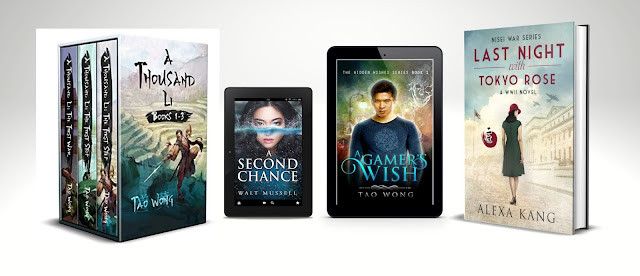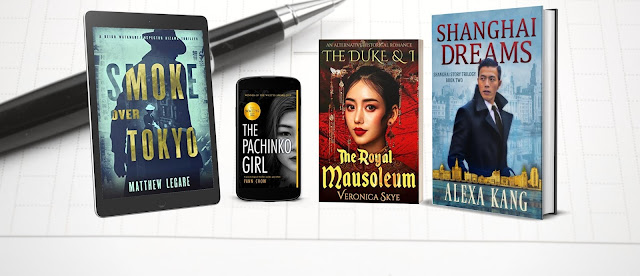In 1923, the Blue Express, a luxury train also known as the Peking Express, departed from Shanghai, chugging northward to Peking. On the night of May 5th, near the town of Lincheng, a gang of Chinese bandits derailed the Peking Express and took the passengers hostage, leading to a standoff that captured the world’s attention.
Wednesday, 16 August 2023
Tuesday, 10 May 2022
Translating literature – not such a lonely business after all
Nicky Harman writes: Literary translation, like writing, is traditionally a one-woman or one-man job. At most, two people might work together to translate a book. Large-scale collaborative translation projects are a thing of the past, the far distant past when the Bible and the Buddhist scriptures were translated. But literary translators are resourceful folk and have begun to get together in mutual support groups. Here, I interview Natascha Bruce and Jack Hargreaves, both of whom are active in such groups and agreed to tell me more about them.
Natascha Bruce translates fiction from Chinese. Her work includes Lonely Face by Yeng Pway Ngon, Bloodline by Patigül, Lake Like a Mirror by Ho Sok Fong and, co-translated with Nicky Harman, A Classic Tragedy by Xu Xiaobin. Forthcoming translations include Mystery Train by Can Xue and Owlish by Dorothy Tse, for which she was awarded a 2021 PEN/Heim grant. She recently moved to Amsterdam.
 Jack Hargreaves is a translator from East Yorkshire,
now based in Leeds. His literary work has appeared on Asymptote Journal,
Words Without Borders, LitHub, adda and LA Review of
Books China Channel. Published and forthcoming full-length works include Winter
Pasture by Li Juan and Seeing by Chai Jing, both of them
co-translations with Yan Yan, published by Astra House. Jack translated Shen
Dacheng’s short story ‘Novelist in the Attic’ for Comma Press’ The Book of
Shanghai and was ALTA’s 2021 Emerging Translator Mentee for Literature from
Singapore. He volunteers as a member of the Paper Republic management team and
releases a monthly newsletter about Chinese-language literature in translation.
Jack Hargreaves is a translator from East Yorkshire,
now based in Leeds. His literary work has appeared on Asymptote Journal,
Words Without Borders, LitHub, adda and LA Review of
Books China Channel. Published and forthcoming full-length works include Winter
Pasture by Li Juan and Seeing by Chai Jing, both of them
co-translations with Yan Yan, published by Astra House. Jack translated Shen
Dacheng’s short story ‘Novelist in the Attic’ for Comma Press’ The Book of
Shanghai and was ALTA’s 2021 Emerging Translator Mentee for Literature from
Singapore. He volunteers as a member of the Paper Republic management team and
releases a monthly newsletter about Chinese-language literature in translation.Tuesday, 22 February 2022
Indie-Spotlight: Selling Books with Asian Main Characters - Part II
Indie Spotlight is a column by WWII historical fiction author Alexa Kang. The column regularly features hot new releases and noteworthy indie-published books, and popular authors who have found success in the new creative world of independent publishing.
Wednesday, 16 February 2022
Indie-Spotlight: Selling Books with Asian Main Characters - Part I
Indie Spotlight is a column by WWII historical fiction author Alexa Kang. The column regularly features hot new releases and noteworthy indie-published books, and popular authors who have found success in the new creative world of independent publishing.
Monday, 5 July 2021
The China Mission by Daniel Kurtz-Phelan - Chinese History at a Crossroads
The question of “Who Lost China to the Communists?” became a political flashpoint in American politics. It gave rise to the McCarthy Era and in some aspects, it still lingers in Western discourse to this day. How and why China descended into full-scale civil war is what The China Mission by Daniel Kurtz-Phelan sets out to answer.
Sunday, 5 July 2020
The Bitter Peace by Philip S. Jowett - Conflict in China 1928-1937
Wednesday, 27 May 2020
How Paper Republic ended up leading what is possibly the world’s biggest collaborative translation
At the risk of blowing my (or at least, our Paper Republic's) trumpet a little, I’m going to start with the back-story: Brigitte Duzan, of Chinese-shortstories.com pointed out to me that a very well-known Chinese writer, Yan Geling, had written a piece blasting the authorities for mishandling the Covid19 crisis, which Duzan herself had translated into French. Why didn’t I do the same and post it on Paper-Republic? I did both, and a single post grew into the Read Paper Republic: Epidemic mini-series of essays and poems, exploring how some impressive Chinese writers (Yan Geling, Han Dong, A Yi, Lin Bai, and Wu Ang) have been personally affected by the COVID-19 outbreak.
Then the Leeds Centre for New Chinese Writing, with whom Paper Republic has partnered on many projects, had a new idea. I quote, ‘What better way to spend lockdown than having a shot at literary translation? You know you always wanted to try it, so why not have a go now?’ The deal was that anyone, anywhere in the world, could have a go at translating a blog post by Deng Anqing (邓安庆) on how he got shut in with his parents as the surrounding cities locked down, and how it affected his relationship with them. We were offering this opportunity to first-time or emerging translators, so after they had all submitted their work, there would be online feedback sessions by members of the Paper Republic team, including myself and Eric Abrahamsen. The final revised and agreed-on translation was to be published as the grand finale to the Read Paper Republic: Epidemic series. We called the project Give-it-a-Go Translation. We put out the call, and we waited.
Wednesday, 26 February 2020
In Homage to the first Buddhist translators, and Martha Cheung
 |
All pictures are my own from the exhibition,
unless
otherwise captioned
|
Wednesday, 4 December 2019
Prizes and parties...
In my more pessimistic moments, I feel Chinese novels translated into English are a hard sell and I’m not sure when or if they will ever become part of the literary ‘mainstream’ in the West. My friend the poet and novelist Han Dong concurs: he reckons that Chinese fiction in foreign languages will never sell like western fiction translated into Chinese. You may or may not agree with his reasoning: Chinese readers are exposed from childhood to life in the west, through classic and new translations, books, films and TV series. But that familiarity doesn’t work the other way around. So Chinese literature doesn’t capture readers’ imagination.
I thought about this argument and wondered: so then do we only read fiction that describes worlds we are familiar with? Well no… not exactly. Just look at the winner of the 2019 Man Booker International prize, Jokha Alharti. Her novel, ‘Celestial Bodies’, is about Omani tribal society, hardly a place most of us have lived in or are familiar with. But it is a beautiful, captivating read.
Wednesday, 25 September 2019
The History of a Place in a Single Object, with Multiple Variations
Wednesday, 26 June 2019
Nicky Harman interviews Jeremy Tiang, Singaporean writer, translator and playwright
Nicky: When you were growing up, what were the first Chinese-language stories you came across, and what drew you to them?
Jeremy: Growing up in a former British colony can be a destabilizing experience. Singapore's official languages are English, Chinese (meaning Mandarin), Malay and Tamil, and there were always several languages swirling around me ― some of which I felt I was being encouraged to know (the English in the Enid Blyton books my parents bought us, the Mandarin they sent me to a neighbour to learn) as well as others I had less access to (the Cantonese they sometimes used with each other, the Tamil my dad occasionally spoke on the phone). I encountered Chinese stories in all kinds of ways, on TV and in my school textbooks, but often freighted with cultural baggage: there was a weight of obligation on us, as English-educated people, to hang on to our Chinese heritage. It wasn't until I got some distance from Singapore, by moving to the UK for university, that I was able to enjoy Chinese-language literature on its own terms. While I came to appreciate the grounding I had received in Singapore, particularly in secondary school, I don't think I read a Chinese novel for pleasure till I was in my twenties. Once I was able to do that, I quickly developed a taste for it. And being a writer of English and a lover of Chinese fiction, it was a logical progression to literary translation ― the best way I could think of to get right inside these books.
Wednesday, 27 March 2019
A New Kid on the Block for Literary Nonprofits
Wednesday, 27 February 2019
My chance to talk for an hour about Chinese literature -- with an excellent interviewer
I had slightly mixed feelings when Georgia de Chamberet and I began our podcast for Bookblast. On the one hand, it was a great opportunity to talk both about the literary translation website I work on, Paper Republic, and the range of novels that feature on our 2018 roll call of Chinese translations into English. On the other hand, Georgia’s questions required some serious thought and I felt I was in danger of making wild generalizations (perhaps inevitable when you’re talking about a country and a literature as big as China). What follows is an excerpt from our Q+A. I hope you’ll find it thought-provoking enough to listen to the full podcast.
Friday, 8 February 2019
米兔. 米兔 / rice rabbit Chinese word of the year
Paper Republic's word of the Year of the Dog, is (#)米兔. 米兔.
米兔. 米兔 means "rice rabbit", but it's pronounced mi-tu, so it represents the hashtag #MeToo.











